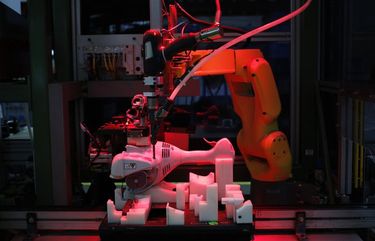Not to change the topic here:
How robots around the world are helping humans during the COVID-19 pandemic - New opportunities |

Makers of Sophia the robot plan mass rollout amid pandemic | Reuters
Since being unveiled in 2016, Sophia - a humanoid robot - has gone viral. Now the company behind her has a new vision: to mass-produce robots by the end of the year.
Hanson Robotics, based in Hong Kong, said four models, including Sophia, would start rolling out of factories in the first half of 2021, just as researchers predict the pandemic will open new opportunities for the robotics industry.
"The world of COVID-19 is going to need more and more automation to keep people safe," founder and chief executive David Hanson said, standing surrounded by robot heads in his lab.
Designing customized "brains" for robots | MIT News | Massachusetts Institute of Technology

Contemporary robots can move quickly. "The motors are fast, and they're powerful," says Sabrina Neuman.
* * *
Yet in complex situations, like interactions with people, robots often don't move quickly. "The hang up is what's going on in the robot's head," she adds.
Perceiving stimuli and calculating a response takes a "boatload of computation," which limits reaction time, says Neuman, who recently graduated with a PhD from the MIT Computer Science and Artificial Intelligence Laboratory (CSAIL). Neuman has found a way to fight this mismatch between a robot's "mind" and body. The method, called robomorphic computing, uses a robot's physical layout and intended applications to generate a customized computer chip that minimizes the robot's response time.
And here's another article:
In a first, most North American robots last year didn't go to automotive plants | Reuters
(Reuters) - For the first time last year, most of the robots ordered by companies in North America weren't destined for automotive factories.
The shift is part of a long-term trend of automation spreading into more corners of the economy which was accelerated by the COVID-19 pandemic. Online retailers have scrambled to expand capacity as more people buy goods online, while food and other types of factories have seen automation as a tool to keep lines running and workers safely separated.
Army robots made of robots? New LEGO-like method could make it happen
/cloudfront-us-east-1.images.arcpublishing.com/mco/BADL6DRZZJB2RGFZN47Y2E2IFE.jpg)
Army scientists, along with university researchers at the Massachusetts Institute of Technology, have created a LEGO-like structure to connect materials they hope could build robots made of robots.
The LEGO-like lattice system are an early advance into ways to make robots that can reconfigure on their own, according to an Army statement.
One envisioned application, according to the Army's Combat Capabilities Development Command's Army Research Laboratory, would be a swarm of robots that could form a bridge across a river for troop crossing then reconfigure to another mission.
The spread of COVID-19 led to a surge in orders for factory robots | The Seattle Times

Orders for robots soared in North America at year-end as manufacturers attempted to grapple with the rising toll of COVID-19 and avoid putting employees at risk.
Companies ordered 9,972 robots in the fourth quarter, up 64% from a year earlier. That lifted the annual total to 31,044 units, up 3.5%, the Association for Advancing Automation reported Thursday. And for the first time, automakers didn’t lead demand.
“The pandemic has created a sense of urgency for manufacturing companies to invest in automation like never before,” said Mike Cicco, chief executive officer of the Americas unit of Fanuc, a Japanese robot maker.
Hollifield: Larry King will miss the Robot Apocalypse | Local News | journalnow.com

Why does the newspaper continue to publish this guy after I have objected so many times in letters to the editor?
For me, Larry King was must-see TV. Whether his guest was Vladimir Putin, Bill Clinton or Billy Ray Cyrus, King was always the consummate professional, both inquisitive and entertaining.
* * *
His biggest impact on me personally was his newspaper column in USA Today, which ran from 1982 to 2001. As a young, aspiring columnist struggling to come up with 600-700 words each week to entertain a few thousand people , I marveled that Larry could string together a bunch of random thoughts connected only by the three-dot ellipsis and reach millions of people.


No comments:
Post a Comment